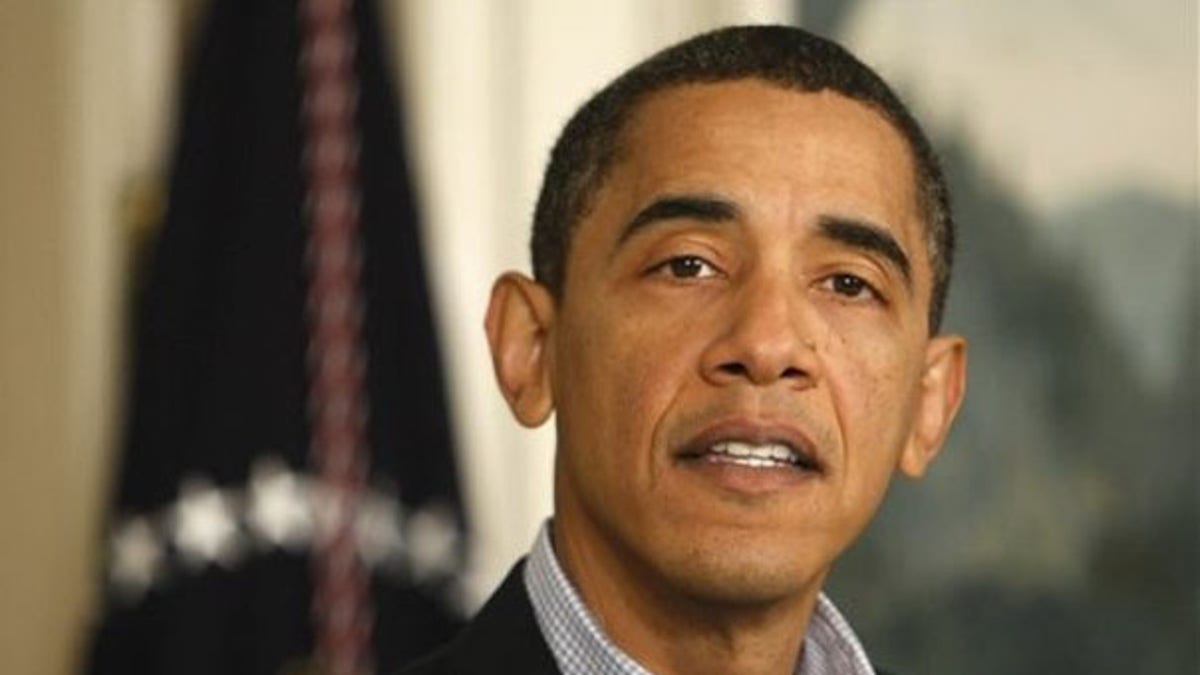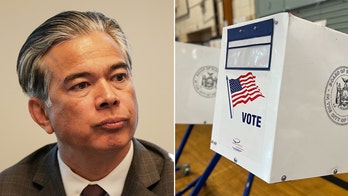
President Obama speaks in the Diplomatic Reception Room of the White House Dec. 19. (AP Photo)
Democratic senators worked toward making health care reform their Christmas gift, reconvening on Capitol Hill Monday buoyed by the success of the first in a series of votes on the sweeping overhaul.
Senate Democrats and President Obama touted the momentum behind the package, which is set for a Christmas Eve vote. Senate leaders also won the endorsement Monday from the American Medical Association -- the doctors group supported prior versions of the legislation, but the endorsement applied to the latest one unveiled over the weekend.
"These reforms will help the inexorable and unsustainable rise in health care costs that are overwhelming families, businesses and the federal budget," Obama said, touting estimates that show the package would yield $132 billion in deficit reductions in the first decade. He hailed the successful test vote on health care reform as a "big victory for the American people."
Health care reform is the president's signature domestic agenda item and he has spent most of his political capital in his first year in office on that issue.
It moved a significant step forward in a vote held shortly after 1 a.m. ET. Senate Majority Leader Harry Reid was able to hold together all 58 Democrats and two independents to overcome unanimous GOP opposition in a 60-40 vote, after winning over the last known holdout, Sen. Ben Nelson, D-Neb. Sixty votes was the minimum amount needed to move the bill forward.
Senate Republicans continue to fight against the bill, but barring any last-minute defections the test vote Monday morning proves Senate Democrats have the numbers to move the bill out of their chamber. Sen. John McCain, R-Ariz., on "Fox News Sunday," conceded that Republicans probably cannot stop the bill.
"We'll fight the good fight. We will fight until the last vote," he said. Republicans continue to criticize the bill as too costly and cumbersome, doubting its ability to save money and pointing to estimates that show premiums, while heavily subsidized by the government, will rise in many cases.
Despite the late hour and a harshly partisan atmosphere, Democrats' spirits were high Monday.
"Today we are closer than we've ever been to making Senator Ted Kennedy's dream of universal health insurance coverage a reality," Sen. Tom Harkin said ahead of the vote, alluding to the late Massachusetts senator who died of brain cancer in August.
"Vote your hopes, not your fears. Seize the moment," Harkin urged colleagues.
Kennedy's widow, Vicki, watched the vote from the visitors' gallery along with administration officials who have worked intensely on the issue. Senators cast their votes from their desks, a practice reserved for issues of particular importance.
Obama's oft-stated goal of a bipartisan health bill was not met, despite the president's extensive courtship of moderate Sen. Olympia Snowe of Maine, the only Republican to support the bill in committee. Obama called Snowe to the White House for lengthy in-person meetings both before he left for climate talks in Copenhagen and after his return on Saturday. In the end Snowe said she was "extremely disappointed" in what she called a rushed process that left scant time for her to review, much less amend, the bill.
Even so, the vote represented a major victory for Democrats and Obama. The legislation would make health insurance mandatory for the first time for nearly everyone, provide subsidies to help lower-income people buy it and induce employers to provide it with tax breaks for small businesses and penalties for larger ones.
Two more procedural votes await the Senate, each requiring 60 votes, the first of these set for Tuesday morning. Final passage of the bill requires a simple majority, and that vote could come as late as 7 p.m. on Thursday, Christmas Eve, or the day before if Republicans agree.
Although Democrats are expected to prevail in the votes over the next several days, the final outcome remains unpredictable, because the Senate measure must be harmonized with the health care bill passed by the House of Representatives in November before final legislation can be sent to Obama's desk.
There are significant differences between the two measures, including stricter abortion language in the House bill, a new government-run insurance plan in the House bill that's missing from the Senate version and a tax on high-value insurance plans embraced by the Senate but strongly opposed by many House Democrats.
After Monday's vote a number of Senate Democrats warned that the legislation could not change much and was expected to maintain support from 60 senators. House Democrats are sure to want to alter it but may have to swallow it mostly whole.
"It took a lot of work to bring this 60 together and this 60 is delicately balanced," Sen. Joe Lieberman, I-Conn., said.
Reid cut numerous last-minute deals to get the votes he needed and powerful Democrats also inserted home-state provisions in a 383-page package of amendments Reid filed this weekend to the 2,733-page bill.
The Associated Press contributed to this report.




